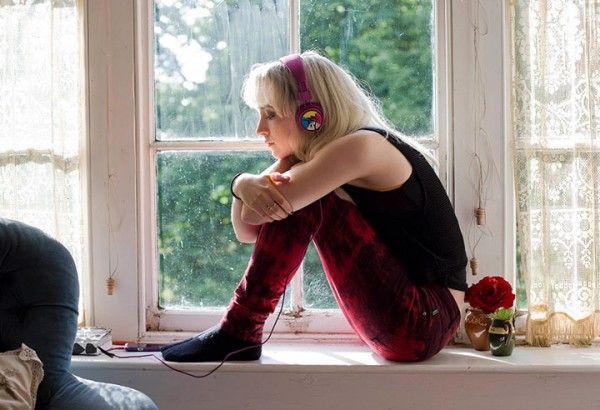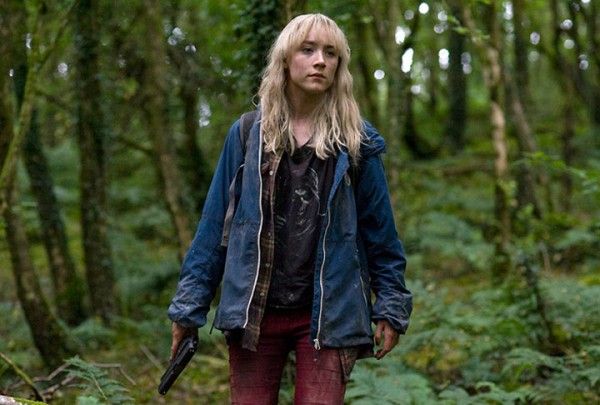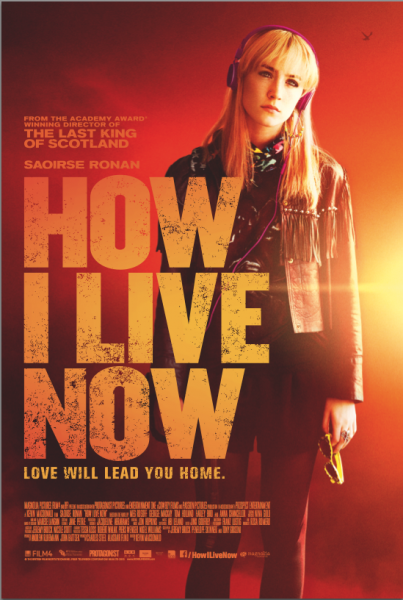From filmmaker Kevin Macdonald (The Last King of Scotland) and adapted from Meg Rosoff’s novel of the same name, the dramatic thriller How I Live Now is set in the near-future and tells the story of an American teenager named Daisy (Saoirse Ronan), who is sent to stay with relatives in the English countryside. With escalating conflict in Europe turning the UK into a violent and chaotic military state, Daisy is separated from her cousin Edmund (George Mackay) and must fight to protect her youngest cousin, Piper (Harley Bird), while attempting to reunite them as a family.
At the film’s press day, actress Saoirse Ronan spoke to Collider for this exclusive interview about what drew her to this project, her desire to play a character that’s not quite as likeable as the ones she’s played in the past, waiting until after shooting the film to read the book it was adapted from, how they decided on Daisy’s look, and how she thinks she’d fare in a situation like this. She also talked about the experience of working with Wes Anderson on The Grand Budapest Hotel, and being a part of Ryan Gosling’s directorial debut, How to Catch a Monster. Check out what she had to say after the jump.
Collider: How did you come to be a part of this film? Was this just a character that was too good to pass up?
SAOIRSE RONAN: Yeah. I loved it when I read it. I read a really early draft, and I think it was before Kevin [Macdonald] and Penny Skinner, and some of the other writers, had really gotten their hands on it. But even then, the idea of playing somebody like that, who had a bit of an attitude problem and had some issues and was very unlikeable, really, for the first little while in the film, I liked the idea. I was desperate to play someone like that ‘cause I had played a few girls who were very kind and nice, and I didn’t really want to do that anymore.
When you play someone like Daisy, who is so different from you, does it make it easier for you, or is it more of a challenge to find her?
RONAN: It did and it didn’t. Sometimes it came be challenging to bring the toughness out. I’m not, hopefully, as harsh as Daisy is, but there’s a bit of her in me. I’m not as nice as some of the other girls I’ve played, I don’t necessarily think. They were lovely. It can be a challenge to bring that kind of attitude out sometimes, but in other ways, it’s a real vent. It’s really therapeutic to get to really experience those emotions and have them become such a big part of the character that you’re playing, especially if you haven’t really gotten the chance to do that before.
Were you ever tempted to read the book before shooting the film, to get more of a feel for what’s going on in Daisy’s head?
RONAN: No, I didn’t feel like I needed to read it ‘cause I liked where the script was. I thought the foundation and the structure of it was strong. Between that, and talking to Kevin about it and what he wanted to do with it, it made sense for me to just focus on that. Also, with this adaptation, in particular, they changed quite a few things about the characters and within the story. There were a few alterations when it came to ages, and when it came to which characters stayed in and which characters didn’t. I just wanted to focus on the screenplay.
Have you read the book since?
RONAN: Yeah, I’ve read it since, and it’s great. It’s nice to read it afterwards. In a way it’s good, and in a way it’s not so great. You’re picturing yourself as this person, and I was picturing George [MacKay] as Eddie and Harley [Bird] as Piper and Tom [Holland] as Isaac. But, it was lovely to read. I read Lovely Bones about a year after we made it. That was such a big part of my life ‘cause it took about nine months to do the whole thing. And then, I had to dub it for another year and a half. I remember when I read it, and it was so emotional when I finally read it, to see where it all came from and to read that story again.
Did it change your perception of the character, at all?
RONAN: No. It was okay. It was so different, in so many ways. Her age was different. I was a little bit older than Daisy was, in the book. Character wise, certain decisions had to be made.
Did you get any input into how you would look in the film?
RONAN: Yeah. There was one day, when we were down in Wales, and between me and Kevin and Franz [Lustig], the D.P., and then Marese [Langan] and Jane [Petrie], who did the hair and make-up and costumes, we all just worked together and tried different things out. I walked around in the clothes, and I walked through the forest, just to see how it would feel. We had to decide how alien we wanted to make her, in this environment. And then, we finally found the right look. It was amazing how much of a relief it was, to know that she needed to have bleach-blonde hair, where her piercings needed to go, and what her hero outfit would be. She also had these thick-soled creepers that meant I was able to do little things with my feet and slouch a little bit. I could make it all very modern, hopefully. It helped me an awful lot to actually realize who the character was.
Was it weird to see your face with piercings?
RONAN: Well, they were only little beads, so they just stuck them on. I was so used to looking at it, every day, that when I saw it on screen I was like, “Oh, yeah, I had three piercings in my face for awhile.” I was used to it, at that stage.
When you tell a story like this, does it make you think about how you would do, in this kind of situation, and what you would be willing to do to survive and get back to your loved ones?
RONAN: It didn’t, at the time, but since everybody has been asking me about it, it has. Someone asked me earlier, “Could you live without love?,” and I don’t think you really could. You automatically think of romance and romantic love, but there’s also the love of your parents and the love you have for your friends and family, and the love you have for what you do. I think everything would be a bit meaningless. So, if you were put in that position, in that situation, and you promise the person that you fall in love with that you will get back to this place, no matter what, you probably would try, or die trying. You hear those stories about mothers who move trucks to get their kids out of harm’s way. Suddenly, people become superhuman because of this amazing love they have for something else.
You’ve worked with some great talent, both in front of and behind the camera. What was it like to have the experience of working with Wes Anderson on The Grand Budapest Hotel?
RONAN: I was so excited about it, and I was a bit nervous, as well, ‘cause it’s such a specific kind of acting style with Wes. But, he’s great. He’s very, very specific about what he wants and about how the film is going to look and how long a scene is going to carry on for. It’s amazing how much he’s thought out his films. He knows them, back to front. He knows the characters better than anyone else does. So, when he says to you, “You know, I think maybe you should just say it like this,” you don’t even question it. He’s not just a director who’s come on board, or even a writer who’s written the script. He’s almost his own character that he’s created. He’s very much within every single character that he writes for the screen.
How did that compare to doing Ryan Gosling’s directorial debut, How to Catch a Monster?
RONAN: It was completely different. It was completely the opposite. And I went straight from Wes’ one to Ryan’s one. Ryan did a lot of improv. He worked a bit like I would imagine Derek Cianfrance to work. He was amazing with all of us. He basically hired us because of who we were, as people, and wanted our personalities to be incorporated into the characters. That meant that, from day to day, if there was a scene that you were doing and you didn’t feel right about where the character was supposed to go, you could do something different. There was one scene that I did, and I was supposed to get into a car with one of the other characters. He came up to me and said, “Do you think Rat would get in the car?” I said, “Well, yeah. It’s in the script. You wrote it. So, yeah, I think she’s do it.” He said, “Well, if you don’t think she would, I’ll rewrite it and we can do it some other way.” It was amazing to have that kind of freedom. He was great, and very brave with everything that he did. He wasn’t afraid to take risks, at all. He was a good one.
How I Live Now opens in theaters on November 8th.




